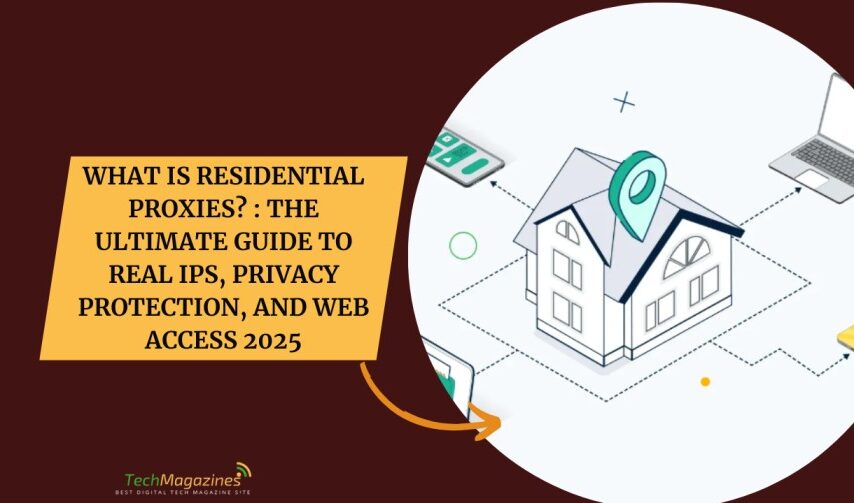The proxy world is highly populated and full of diverse options. However, residential proxies are always on the spotlight, and they are not cheap at all. They use IPs from real homes. Real people. That’s why they cost more. And people raise questions. Why the high price? Are they worth it? And the difficult one—are they legal? We’ll keep it simple. No fluff. Just the facts. First, the basics. Then the reality of what they are worth and where the law is on that particular issue. This is a straight shoot to residential proxies and how they work. Because being anonymous should not feel like committing a crime or speaking in code.
How do Residential Proxies Work?
A residential proxy, like any proxy, stands between you and the internet. It hides your real IP. Keeps you anonymous. The difference is in the IP it uses. These come from real homes. Real places. That makes them harder to block.
Here’s how it works, step by step:
You make a request to visit a site.
It doesn’t go straight there. It goes to the proxy.
The proxy picks it up and sends it to the site for you.
The site replies to the proxy.
The proxy sends that reply back to you.
Simple.
Now, the reasons this matters:
- You stay hidden. Your real IP never shows. No one can follow you home.
- You can reach content locked in other parts of the world. The proxy can make it seem like you’re somewhere else.
- You don’t get blocked so easily. Sites think you’re just another regular person. Because, well, the proxy looks like one.
What Makes Residential Proxies Unique?
A residential proxy works as a middleman between you and the website you are accessing. It uses a real IP—an IP address assigned to people by their Internet service provider. It can be used to stay private. Or to access some sites that are difficult to be reached by other proxies. It works when others don’t. That’s its strength.
Understanding Residential IP Addresses
A residential IP is associated with a real device as it is allocated to a home user. A phone. A tablet. A computer. The internet provider supplies it, and it is available in the public domain. Websites can see where it came from, what provider, what network, what place.
Types of Residential Proxies
A residential proxy is one kind of proxy. But even within it, there are different types.
Take shared residential proxies. The name says it all. Many people use the same proxy at once. That makes them cheap. Some of the cheapest you can find. Still, they move fast. That’s because the system behind them is strong. Built to handle the load.
But there’s a trade. You give up some safety. Some privacy. With more users, the risk goes up. And websites are quicker to block them. That’s the price you pay.
1. Mobile Proxies
Mobile proxies use IPs from phones and other mobile devices. Like dedicated residential proxies, they’re fast. Reliable. But that comes with a price. They don’t come cheap. And still, they can get blocked. It happens more than you’d think.
2. Rotating Residential Proxies
These proxies change their IPs on their own. They switch at random times. That makes them hard to track. Hard to block. They’re safe. Very safe. But they cost more. The best things usually do.
3. Static Residential Proxies
Static proxies use real IPs from real homes. Given by internet providers, not proxy farms. That makes you look like a regular person online. Normal traffic. Nothing strange. Nothing to raise alarms.
Dedicated Residential Proxies
Another type that you should be familiar with is the residential proxy of the dedicated type. It’s used often. Especially for scraping the web. It has to be given its own place in the story. As with any other proxies, it’s a gate. It is through it that you forward your traffic. But here is the difference – this one is yours alone. No one else uses it. Just you. If you are interested in speed, privacy, and reliability, this one is the one to go for. It’s strong. It’s steady. But it’s not cheap. But, establishing it is not easy. If you are dealing with a site that is difficult and other tools cannot access it or get banned, then you need dedicated proxies. They get the job done. When others can’t.
Main Differences Between Residential & Datacenter Proxies
Datacenter proxies are another common kind. People often compare them to residential proxies. They do the same basic thing—hide your real IP and route your traffic. But they’re different. In where they come from. In how much they cost. And in how well they hold up.
Sourcing.
Residential proxies use real IPs from real homes. Given by internet providers. Datacenter proxies don’t. They come from data centers. Or cloud servers. Built for speed and scale. Not for looking real.
Pricing.
Residential proxies cost more. They’re harder to get. Harder to maintain. Datacenter proxies are cheaper. Easier to set up. No real homes. No real people.
Getting blocked.
Residential proxies look like regular users. So they don’t get blocked easily. Datacenter proxies? Not so lucky. Sites can spot them. Unless they’re from a good provider. Then they work just fine, most of the time.
Is it Legal to Use Residential Proxies?
People often ask, “Are residential proxies legal?” It’s a fair question. These proxies use real people’s IPs. That alone raises eyebrows.
There’s no clear answer. It depends. One thing is certain—you must not use them for anything illegal. That means no scraping of copyrighted or private data. No shady business. If you’re unsure, talk to a lawyer. It’s the only way to be sure you’re not breaking the law.
Also, use a trusted provider. One that’s honest about where their IPs come from. You need to know they’re sourced the right way.
Many use residential proxies to scrape public websites. That’s legal. But scraping private or protected sites? That crosses the line. And the law will be waiting.
Conclusion
In the vast frontier of the internet obscurity, residential proxies are the most premium of them all—costly but efficient. They are the contrast between entering a party through the front door and sneaking through the heating, ventilation, and air conditioning system. The bottom line? Residential proxies are considered the most legitimate proxies as they mimic the IP addresses of real households. But always bear in mind, having such power also means that you have the responsibility.
It is legal to possess it just like a chef’s knife but becomes unlawful when used to unlock doors instead of cutting onions. Be selective, crawl properly, and when unsure, seek legal advice before going into the gray areas.
FAQs
Q1: Why are residential proxies more expensive than datacenter proxies?
It is as if residential proxies are the real designer handbags of the datacenter proxies’ fake ones. They are more expensive because they are obtained from real households with real IP addresses provided by real ISPs. It is like going to a tailor and paying extra for a costume of your choice as compared to going to a store and buying a plastic mask for a dollar. The factor that increases the price is the anonymity – websites cannot differentiate between them and ordinary users, which is why they are the best option for those who require a fast, stealth connection.
Q2: Can websites detect that I’m using a residential proxy?
In theory, websites shouldn’t be able to see you. Residential proxies can be described as the internet version of an invisibility cloak made from real human hair, not the synthetic material that most people think of. As they obtain real residential IPs from actual homes, most websites will welcome you as any other visitor coming for tea. However, no disguise is perfect. Some complex sites have implemented ways of detecting proxies that may detect such browsing patterns. However, it is essential to note that datacenter proxies are much easier to identify than the residential ones which makes the latter much more effective.
Q3: Is web scraping with residential proxies legal?
Here is the place where one is likely to encounter the issue of digital ethics. It is legal to scrape data using residential proxies as it is similar to taking notes in a public library. However, when it comes to scraping private data or when you violate a certain website’s Terms of Service, that is when the trouble starts. It is like the same way that a camera is legal to possess, but using it to spy through someone’s windows is not. Before web scraping, always read the robots.txt file and terms of service of the site and if still in doubt, seek the help of a legal professional rather than the internet.
Q4: How do rotating residential proxies work?
Rotating residential proxies can be described as a spy movie where the hero changes his appearance at every scene to go unnoticed. These systems dynamically alter the IP address assigned to you at a given time or after each of the request. This makes your digital footprint more difficult to trace. In cases such as data mining or market analysis, where you need to make hundreds of requests, this constant switching prevents the security systems from flagging the same IP address. However, you should always bear in mind that this convenience is usually associated with a higher cost.





